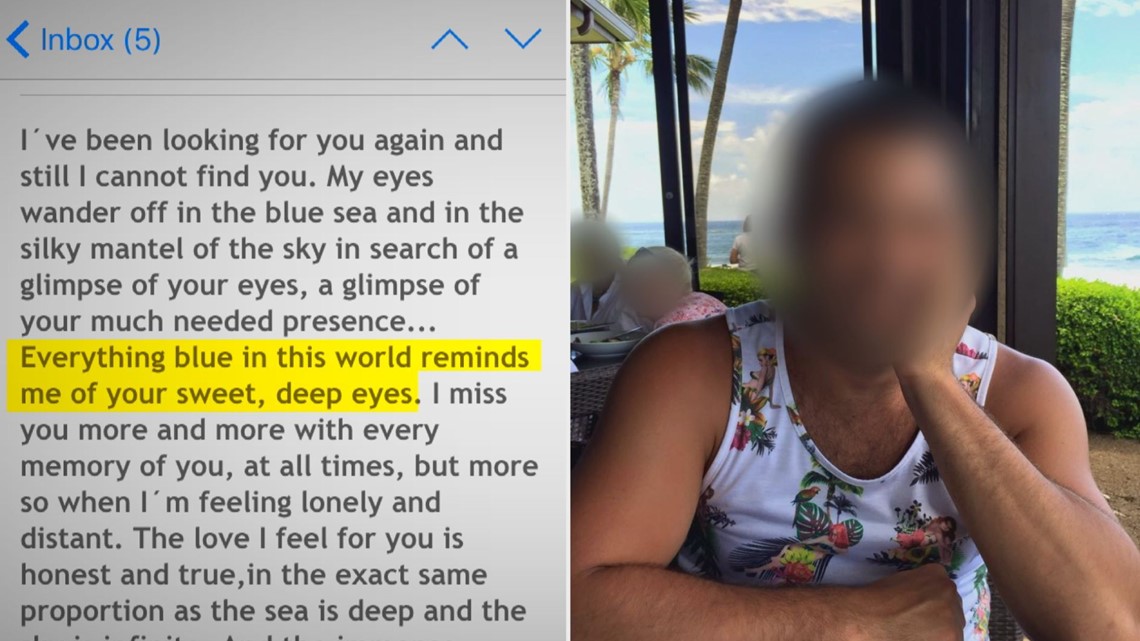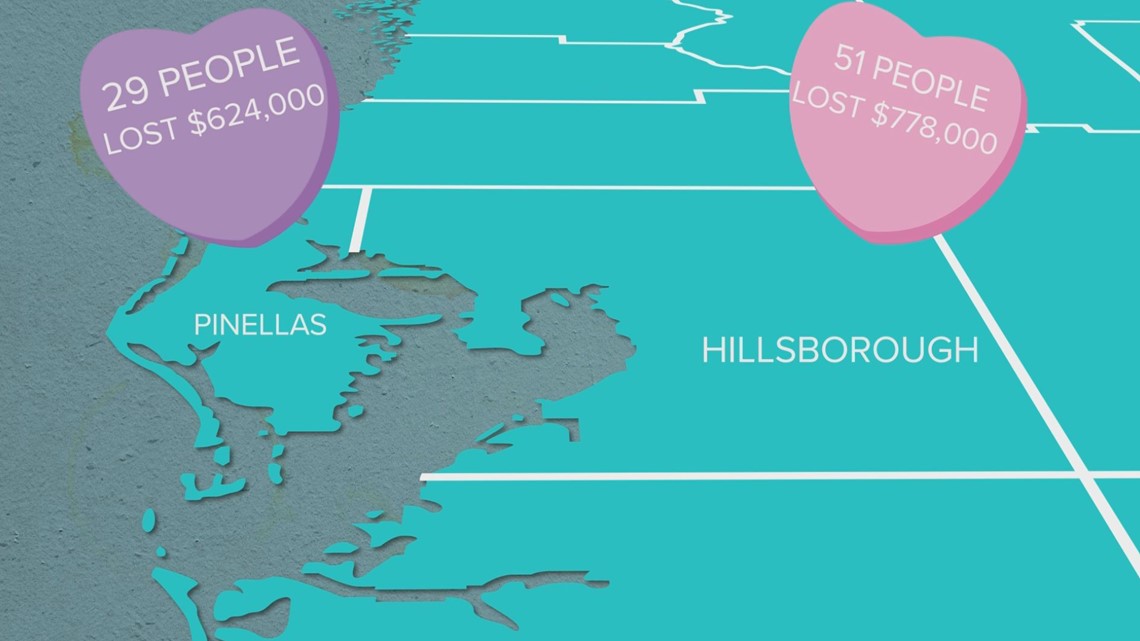TAMPA, Fla. — This story is the latest installment in our YouTube series, "What's Brewing,” investigative reporter Jenna Bourne's series of homemade deep dives into important issues during the coronavirus pandemic. Click here to check out the series and subscribe to our YouTube channel: The Deeper Dive.
COVID-19 has created the perfect storm for catfishing.
Online scammers are preying on people’s loneliness and isolation.
They pretend they want a romantic relationship, then use your feelings to con you into sending them money.
“They know what to say to you. They know how to manipulate you and create this veil of lies,” said Rebecca D’Antonio, who fell for a romance scam a few years ago.


D’Antonio lives in Orlando and loves all things Disney and Harry Potter.
“My geekdom knows no limits,” she said.
When “Matthew” reached out to her on a dating site, she thought she hit the jackpot.
“God, he’s sexy,” said D’Antonio with a laugh. “At first, I was like, gee, this guy is really good looking. Why would he be interested in me? Well, you know, I’m pretty cool. Maybe it’s my personality or something.”
D’Antonio swooned over messages like, “Everything blue in this world reminds me of your sweet, deep eyes.”


After a few weeks of messaging, D’Antonio said “Matthew” started asking for money.
“He had a son by the name of Evans who was 5 years old. I love children, but I can’t have children,” she said. “They had gone on this trip and his credit card stopped working…. So, he wanted me to help them and I was, you know, very uneasy about it…. In the end, I was of the position I could not, you know, leave a 5-year-old in a bad situation. And that is how they got me. They look for that hook. What is going to make you send that first bit of money? And for me, it was the child involved. And then from there, it escalates.”
She said it continued to escalate for about a year.
“I was being sued by Discover card. I was being evicted from my apartment. I was really thinking about suicide,” D’Antonio said.
>> 10 Tampa Bay Cares: If you or someone you know is struggling, there is help. The National Suicide Prevention Lifeline can be reached 24/7 at 800-273-8255.
Bankruptcy was D’Antonio's only way out.
Now she says the pandemic has her worried that more people will get catfished.
“COVID is the perfect real-world situation for a person to get scammed. People are at home more. They’re online more. They’re looking for that connection. There are real world reasons already built in to say, ‘I need money, but I can’t come see you,” said D’Antonio.
10 Investigates checked with the FBI for their data on romance and confidence scams – that’s when someone cons somebody else into sending money by making them think they have a trusting relationship.
In 2019, the FBI got 19,473 reports of those scams, with people losing more than $475 million.
Compare that to 2020, when the FBI got nearly 23,768 reports. That’s a 22 percent increase.
And those people reported losing more than $600 million – a 26 percent increase over 2019 losses.
Supervisory Special Agent Keith Givens, who in charge of any fraud related to COVID-19 in the FBI’s Tampa Division, said the pandemic is to blame for the increase in romance scams.
“The pandemic has created ideal conditions for romance scam fraudsters to thrive,” said Givens. “You have a situation where people are isolated. People aren’t able to interact in person as they did prior to the pandemic. So that leads a lot of people to go online.”
It’s a pattern David McClellan said his team has noticed at SocialCatfish.com, a website that helps verify people you meet online.
“We deal a lot with people that have their images stolen and so we hear that side. And then we also deal with a lot of victims,” said McClellan. “These scammers were using COVID as an excuse of why they couldn’t get to them and why they needed money…. They’re using this plot saying they’re stuck overseas because of COVID and they can’t get back overseas. Or they caught COVID, and they’re stuck in the hospital, and they can’t get proper treatment,” said McClellan.
FBI data shows Florida is consistently among the top states where people get conned by romance scammers.
In 2020, 1,603 Floridians told the FBI they lost $40 million in a romance or confidence scam.
In Hillsborough County, 51 people reported they lost $778,000.
In Pinellas County, 29 people reported $624,000 in losses.


“Well, it’s a bit of a perfect storm. You have a large elderly population here. You have a lot of people that are retired. They have a lot of discretionary income,” said Givens. “We see our older population is less aware of the concerns about the internet or even more likely to believe, simply, what they see online.”
Givens said one red flag to watch out for is not just asking for money but asking for it in suspicious ways, like iTunes gift cards.
“There was a lot of spelling and grammar mistakes. There was a lot of details which I was pretty sure I told him, but he must have forgotten,” said D’Antonio. “They don’t use your name a lot. They’ll use endearments – my darling, my sweetheart, my goddess. Because what they’re doing is they are working 30-40 people at the same time.”
If you suspect you or a loved one has been scammed, you can go to ic3.gov to file a complaint with the FBI. That’s the bureau’s Internet Crime Complaint Center.
“We have two goals. One is to try to make the victim whole. We actually do try to get victims their money back, whenever possible. And then the second is to obviously punish the fraudsters, incarcerate them, if possible,” said Givens.
D’Antonio said she hopes sharing her story will help prevent others from falling prey to a romance scammer.
“I would say my one big piece of advice for anyone that is looking not to get scammed, particularly online, is that if anybody is ever asking you for money, particularly when it’s a relationship that you haven’t built organically in-person, run. Love yourself enough to run.”
- Florida bill would increase police powers to use drones
- College misused millions in student fees to pay for athletic scholarships
- That’s a lot of OT: Some state-run mental health hospital employees work 80 hours a week
- Government workers abusing access to your private info face few consequences
- Homeowners are signing away their rights. Local governments are cashing in.
►More stories from 10 Investigates: Get the free 10 Tampa Bay app
►Don't miss a What's Brewing episode! Sign up now for the Brightside Blend Newsletter

